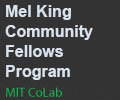Class of 2013—Labor/Community Partnerships
The Community Innovators Lab’s Mel King Community Fellows Program is dedicated to the legacy of Mel King, a still-active champion of cities and the communities they comprise. Mel King initiated the Community Fellows Program in 1970 when he was an adjunct professor at MIT. The program offered Fellows a year-long sabbatical at MIT, where they could reflect, conduct research, acquire skills, and build new relationships.
Overview
The CoLab Mel King Community Fellows program builds upon a 40-year-old tradition of bridging practice-based knowledge and academic research. However, instead of undertaking a year of study at MIT, current Fellows continue working in their respective sites while simultaneously deepening their connections with each other. CoLab staff, students, and faculty affiliates support Fellows as they undertake self-directed mutual learning projects. To date, CoLab has hosted three classes of Mel King Community Fellows.
Mel King Fellows are recognized leaders in communities across the country and have experience in a range of social justice pursuits. The program’s goal is to create a dispersed learning network among the Fellows for co-creating knowledge. Fellows focus on exploring emerging issues in cities at the local level, investigating longstanding debates about deepening democracy and improving their understanding of the connections between economic justice and democracy – economic democracy. MIT faculty may recommend candidates for the Mel King Community Fellows Program.
Selection Process
Mel King Community Fellows are nominated by peers, members of the academy, foundation officers and others. Fellows are rigorously vetted by MIT CoLab and approved by CoLab’s Faculty Council, comprised of senior MIT Department of Urban Studies and Planning faculty. Criteria include:
- Demonstrated commitment to social and economic equity, racial, ethnic and gender inclusion, and community participation, particularly of historically marginalized groups, in planning the future of cities;
- Track record of experience with community engagement
- Demonstrated interest in working collaboratively to examine links between theory and local practice.
- Clear and well-developed individual or collective project to explore issues related to urban sustainability, democratic participation and shared wealth generation.
Once appointed, each Fellow is assigned a faculty member to support their project, link them to relevant MIT resources, and to ensure sufficient connection between the Department/ School faculty, students and the Fellows’ work.
Program Design
Through two to three two-day convenings at MIT, as well as field-based learning journeys and peer learning opportunities, the Mel King Community Fellows program provides participants an opportunity to examine:
1) Connections between markets and democracy and how market based activities can help advance democratic participation;
2) Emerging models of community planning and development that advance urban sustainability;
3) Shifts in methods and approaches that will be required by these new models; and
4) Reflective practice methods that will aid them in collaborative innovation and knowledge-sharing
Each class of Mel King Fellows has a substantive focus related to economic democracy and the future of cities.
Class of 2013
The 2013 MIT CoLab Mel King Community Fellows (MKCF) program is focused on labor/community partnerships and innovative approaches to organizing worker power. It will have a particular focus on exploring the applicability of the Mondragon worker cooperative model to the US context. The class brings together a strategic grouping of labor and community leaders from around the country who are interested in investigating new frameworks for advancing worker power and economic democracy – and working more effectively together. The Mel King Class of 2013 are seasoned leaders. They are concerned with the current state of US-based social movements and are pursuing new ideas and directions. From May 2013-May 2014, they will spend time reflecting about how social justice, worker and labor movements in the US could benefit from innovative approaches to organizing workers’ economic power and building labor-community collaborations. It is hoped that through this Fellowship, they will build strategic relationships with each other with a view toward helping each other strengthen their movements and make stronger connections to economic democracy. The MKCF at MIT CoLab provides the shared space for deliberation and facilitates a six-month-long collective leadership journey.
Fellowship Experiences Will Include
- A two day workshop in May providing advanced observational and communication skills and analytical frameworks for understanding new approaches to organizing worker economic power and economic democracy.
- A week-long immersive experience in Mondragon in July 2013 including coursework, site visits, in-depth discussion with Mondragon leaders and group reflection and discussion time.
- A two-day final workshop in October to share lessons and explore future prospects for applying lessons learned in a US context.
The Mondragon Experience
The Mondragon Corporation is the second-largest workers' cooperative complex in the world, employing around 90,000 workers in a wide variety of industrial sectors. It’s scale and diversity of enterprises (including banking, education, retailing, manufacturing, services) coupled with its long tradition of worker democracy and governance, is distinctive in the world. During the current global economic crisis, Mondragon has significantly outperformed the rest of Spain, with its unemployment rate, for example, being half that of the rest of the country. Each year the Mondragon Corporation hosts delegations from around the world of visitors who are curious to understand the Mondragon model. To date, 5,000 such delegations have visited Mondragon.
During their journey, the MKCFs will see first-hand how the workers cooperatives operate through various field visits and presentations. Time will be allocated to allow the group to process and reflect on their learning experience and to connect more deeply with each other as well.
Please see the attached program schedule for details of the three Fellowship modules.
Expected Fellowship Outcomes Include
- Increased understanding of analytical frameworks of economic democracy.
- Enhanced communication, planning and leadership capacity to undertake labor-community partnerships aimed at advancing economic democracy.
- Network of labor and community leaders who collectively support and accelerate each others’ efforts to build partnerships between their own and other social movements.
- Practicable ideas, insights and information about potential new strategic directions for organizing and leveraging worker power.
